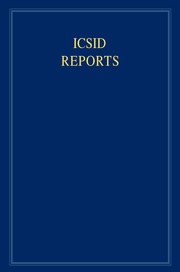No CrossRef data available.
Article contents
Bayindir Insaat Turizm Ticaret Ve Sanayi AŞ v. Islamic Republic of Pakistan
Published online by Cambridge University Press: 06 July 2022
Abstract
Jurisdiction – Investment – Interpretation – Whether the requirement of conformity with local laws under the BIT referred to the definition or the validity of the investment – Whether know‑how, equipment, personnel and financing constituted assets within the meaning of the BIT
Jurisdiction – Investment – ICSID Convention, Article 25 – Whether the elements of the Salini test were satisfied
Jurisdiction – Contract – Relationship between treaty claims and contract claims – Whether the essential basis of the investor’s claims was purely contractual such that the tribunal did not have jurisdiction over such claims
Jurisdiction – Standard of review – Sufficiently substantiated claims – Whether the facts alleged by the investor, if proven true, would be capable of constituting a violation of the BIT such that the tribunal had jurisdiction over the claims
Procedure – Admissibility – Parallel arbitration proceedings – Whether exercising jurisdiction would raise a conflict between the New York Convention and the ICSID Convention
Procedure – Admissibility – Abuse of process – Whether the investor’s conduct in commencing ICSID proceedings when it had previously treated its claims as purely contractual constituted an abuse of process
Procedure – Admissibility – Prerequisites to arbitration – Notice requirements – Waiting period – Whether the investor was permitted to submit the dispute to arbitration in light of the prerequisites in the BIT
Procedure – Stay of proceedings – Whether the tribunal should stay the ICSID proceedings until resolution of the contractual dispute in separate arbitration proceedings
State responsibility – Attribution – State-owned entity – ILC Articles on State Responsibility, Article 4 – Whether a body corporate with separate legal status was an organ of the State
State responsibility – Attribution – State-owned entity – Contract – ILC Articles on State Responsibility, Article 5 – Whether a body corporate was exercising governmental authority in its contractual conduct
State responsibility – Attribution – State-owned entity – Contract – ILC Articles on State Responsibility, Article 8 – Whether actions exercised under a contract by a body corporate were on the instructions of or under the direction or control of the State
Evidence – Contract – Standard of review – Whether the tribunal needed to determine that there was a breach of the contract to decide claims under the BIT
Most-favoured-nation treatment – Interpretation – Fair and equitable treatment – Whether a standard of fair and equitable treatment could be imported through the BIT’s provision for most-favoured-nation treatment – Whether the preamble of the BIT supported that interpretation
Fair and equitable treatment – Legitimate expectation – Legal stability – Whether the investor’s legitimate expectations were frustrated as a result of political volatility
Fair and equitable treatment – Conspiracy – Evidence – Standard of proof – Whether a conspiracy would breach the standard of fair and equitable treatment – Whether the investor had adduced sufficient evidence to meet the high standard for establishing a conspiracy
Fair and equitable treatment – Coercion – Evidence – Whether the investor had adduced sufficient evidence that it had been subjected to coercion or threats by military personnel
Fair and equitable treatment – Due process – Procedural fairness – Transparency – Whether relevant procedural requirements applied to internal decision-making processes of a party to a contract
Fair and equitable treatment – Contract – Sovereign powers – Whether actions carried out by a contractual party were an exercise of sovereign powers in breach of fair and equitable treatment
National treatment – Discrimination – Intention – Whether intent to discriminate was required to find a breach of national treatment
National treatment – Contract – Comparators – Evidence – Whether the investments were in “similar situations” to other contractual arrangements
Most-favoured-nation treatment – Discrimination – Intention – Whether intent to discriminate was required to find a breach of most-favoured-nation treatment
Most-favoured-nation treatment – Contract – Comparators – Evidence – Whether the investments were in “similar situations” to other contractual arrangements
Most-favoured-nation treatment – Evidence – Burden of proof – Whether the investor’s burden could be shifted when its access to information and evidence was limited
Expropriation – Indirect expropriation – Assets capable of being expropriated – Whether interference with contractual rights could lead to expropriation under the BIT
Expropriation – Indirect expropriation – Substantial deprivation – Whether there could be substantial deprivation when the scope of the rights alleged to be expropriated was limited by the counterparty’s rights under the contract
Keywords
- Type
- Case Report
- Information
- Copyright
- © Cambridge University Press 2022




